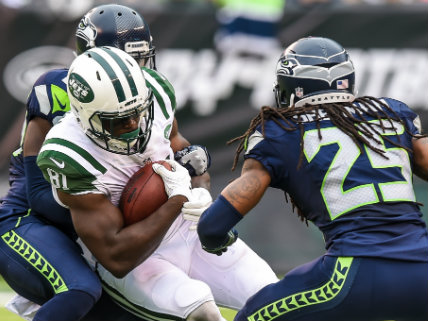Like Most Americans, NFL Players Think They Should Be Allowed to Use Medical Marijuana
The NFL's opposition to legal medical pot (like the federal government's) increasingly runs against not only public opinion but common sense.

Like the vast majority of Americans who watch them on television every Sunday during the last four months of the year, an overwhelming majority of professional football players believe medical marijuana should be legal.
In a survey conducted by BudTrader.com, an online medical marijuana marketplace, more than 150 current and former professional football players were asked for their experiences with various types of painkillers, including opioids and marijuana. Though marijuana is current banned by the National Football League, 68 percent of the current and former players polled said they had used marijuana (either for recreational or medical purposes) during their career, while 87 percent said they would use it if the league allowed it (and 89 percent said they believed it would be an effective treatment for pain and other ailments).
Sure, a business like BudTrader.com has an interest in seeing medical marijuana more widely accepted and legalized, which is why they do polls like this. But their polling of NFL players matches with national attitudes towards medical marijuana, which is now legal in 29 states. A Quinnipiac University Poll conducted in February found support for medical marijuana at 93 percent nationwide, with large majorities cutting across all demographics. According to Gallup's latest polling, support for legalizing recreational marijuana is at 60 percent, the highest percentage recorded in the polling firm's 47 years of tracking that question.
The NFL's resistance to legal medical marijuana (like opposition in government from people like New Jersey Gov. Chris Christie and Attorney General Jeff Sessions) increasingly runs against not only public opinion but common sense. Roger Goodell, the NFL commissioner, told ESPN last month that he supports a continued ban on marijuana because he thinks the drug could be "negative to the health of our players."
That's pretty laughable, as Reason's Mike Riggs pointed out last week, considering that NFL players are playing a sport that is demonstrably more dangerous to their health than marijuana is.
Add to that the fact that many NFL players are being loaded up with other forms of painkilling drugs, often dispensed by the same team doctors that are supposed to care first and foremost about the players' health. In the BudTrader.com survey, 91 percent of players said they had taken opiate-based painkillers like oxycodone, hydrocodone, and propoxyphene. Additionally, 45 percent of players said they had felt pressured into taking those drugs by team doctors, staff, and teammates in order to get back on the field (68 percent say they have been concerned about their usage of painkillers, and 74 percent say they've had negative side effects from using them).
In fact, the NFL currently is fighting a lawsuit from several former players who allege that official team doctors literally handed out piles of opioids and other painkillers—ignoring federal laws for prescription drugs and disregarding medical guidance—before, during, and after games. Deadspin has all the details on the lawsuit, which includes several telling anecdotes about how team doctors allegedly hand out opioids like candy on NFL sidelines.
As I've written before, the NFL's anti-pot policy might make a degree of sense if it was part of an overall effort to prevent teams from using painkillers of any kind, lest some players or teams gain a competitive advantage on the gridiron. That's hardly the case, as the lawsuit and poll demonstrate.
A majority of states now allow medical marijuana as a treatment for at least some medical continues. It's time the NFL (and the federal government) get on board.


Show Comments (12)